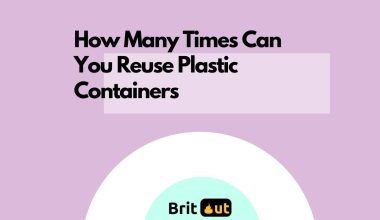Have you ever opened up your dishwasher only to find a melted plastic container or lid stuck to your dishes? It’s a nightmare scenario that can leave you wondering if your kitchen has turned into a toxic waste dump. But fear not! In this article, we’ll explore the fascinating topic of melted plastic in dishwashers and answer the question that’s been keeping you up at night – is it safe? We’ll take a closer look at what happens to plastic when it’s exposed to high heat, what chemicals might be released, and whether or not it’s a cause for concern. Let’s roll up our sleeves, put on our safety goggles, and get to the bottom of this melted plastic mystery!
What Happens When Plastic Melts in the Dishwasher
When you put plastic containers, lids or utensils in the dishwasher, they are exposed to high heat and pressure during the washing and drying cycles. Over time, repeated exposure to these conditions can cause the plastic to melt or warp, changing the shape and structure of the plastic.
So, what exactly happens when plastic melts in the dishwasher? Well, it’s not just a matter of the plastic changing shape. Melted plastic can also release harmful chemicals that can pose a risk to your health. When plastic is exposed to high heat, it can break down into smaller molecules, some of which may be toxic. These molecules can then leach into your food or drinks, potentially causing harm to your body.
The type of plastic that melts in the dishwasher is also important to consider. Not all plastics are created equal, and some are more prone to melting than others. For example, plastic containers made from low-density polyethylene (LDPE) or polypropylene (PP) are less likely to melt than those made from polycarbonate (PC) or polyvinyl chloride (PVC).
Note: Melted plastic can also damage your dishwasher. When plastic melts and adheres to the heating element or other parts of the dishwasher, it can cause mechanical problems and even lead to fires.
In a nutshell, when plastic melts in the dishwasher, it’s not just a cosmetic issue – it can also be a health hazard. It’s important to take precautions, and properly dispose of any plastic kitchenware that has melted.
What Chemicals are Released When Plastic Melts
As mentioned earlier, when plastic melts in the dishwasher, it can release harmful chemicals that can pose a risk to your health. These chemicals can vary depending on the type of plastic that is melting, but some of the most common ones include BPA, phthalates, and dioxins.
BPA, or bisphenol-A, is a chemical that is often used in the production of polycarbonate plastic. This type of plastic is commonly used in food storage containers and baby bottles. When BPA is exposed to high heat, it can break down and leach into your food or drinks. BPA has been linked to a number of health problems, including reproductive issues, developmental problems, and cancer.
Phthalates are another type of chemical that can be released when plastic melts in the dishwasher. These chemicals are often used as plasticizers, which help to make plastic more flexible and durable. However, phthalates have been linked to a number of health issues, including hormone disruption and developmental problems.
Dioxins are a family of chemicals that are often produced as a byproduct of industrial processes, including the production of PVC plastic. When PVC plastic melts in the dishwasher, it can release dioxins, which have been linked to a number of health problems, including cancer, reproductive issues, and developmental problems.
Understand that not all types of plastic will release harmful chemicals when they melt. However, it’s difficult to know for sure which plastics are safe and which are not, so it’s important to take precautions to avoid melted plastic in your dishwasher.
To avoid exposure to these harmful chemicals, it’s best to avoid using plastic kitchenware in the dishwasher altogether. Instead, opt for glass or stainless-steel containers, which are less likely to release harmful chemicals when exposed to high heat. Additionally, be sure to dispose of any plastic kitchenware that has melted, as it can be difficult to fully remove the harmful chemicals from the melted plastic.
Is Melted Plastic in the Dishwasher Toxic?
Yes, melted plastic in the dishwasher can be toxic. As discussed earlier, melted plastic can release harmful chemicals like BPA, phthalates, and dioxins, which can pose a risk to your health. These chemicals can leach into your food or drinks, potentially causing harm to your body.
However, the degree of toxicity will depend on several factors, that includes the type of plastic that has melted, the temperature and duration of exposure, and the amount of plastic that has melted. Meanwhile, note that not all types of plastic will release harmful chemicals when they melt, some plastics are less toxic than others.
That being said, it’s difficult to know exactly which plastics are safe and which are not, so it’s best to stick to the side of caution and avoid using plastic kitchenware in the dishwasher altogether. If you must use plastic in the dishwasher, be sure to choose containers that are made from low-density polyethylene (LDPE) or polypropylene (PP), as these types of plastic are less likely to melt and release harmful chemicals.
If you discover that plastic has melted in your dishwasher, it’s important to take steps to minimize your exposure to the toxic chemicals. Be sure to remove any melted plastic from the dishwasher and dispose it properly. You may also want to run the dishwasher through a cycle with just hot water and vinegar to help remove any residual chemicals.
Conclusion
Melted plastic in the dishwasher can indeed be toxic, as it can release harmful chemicals like BPA, phthalates, and dioxins that can pose a risk to your health. While the degree of toxicity will depend on several factors, such as the type of plastic that has melted and the amount of exposure, it’s best to avoid using plastic kitchenware in the dishwasher altogether to minimize your risk of exposure to these chemicals. Opting for glass or stainless-steel containers instead, and properly disposing of any plastic that has melted can help to protect you and your family from potential harm. By taking these simple precautions, you can help ensure that your kitchen is a safe and healthy environment.






